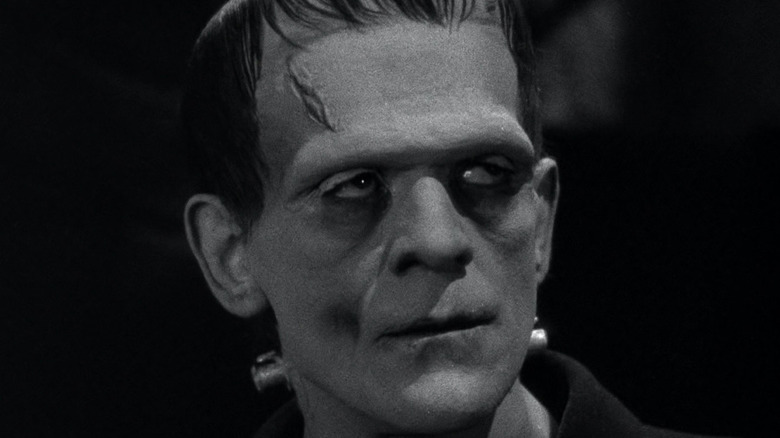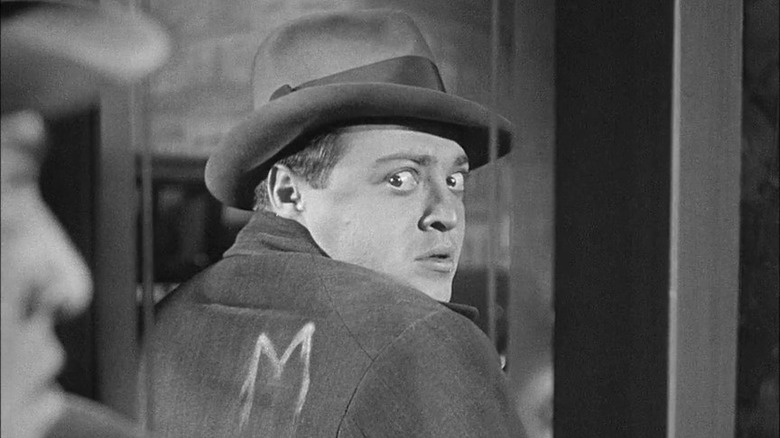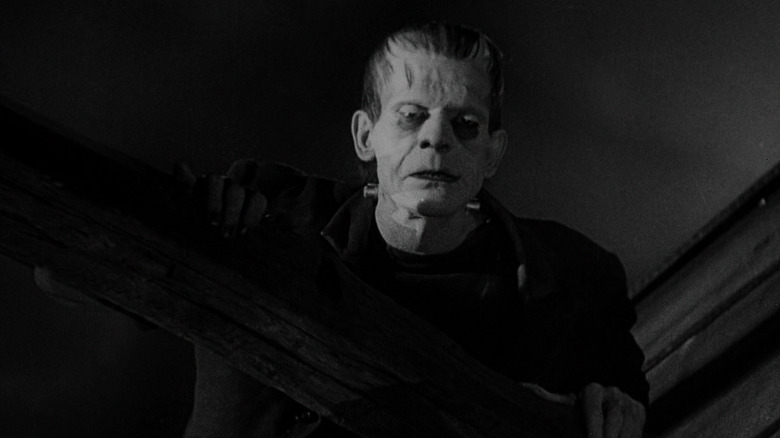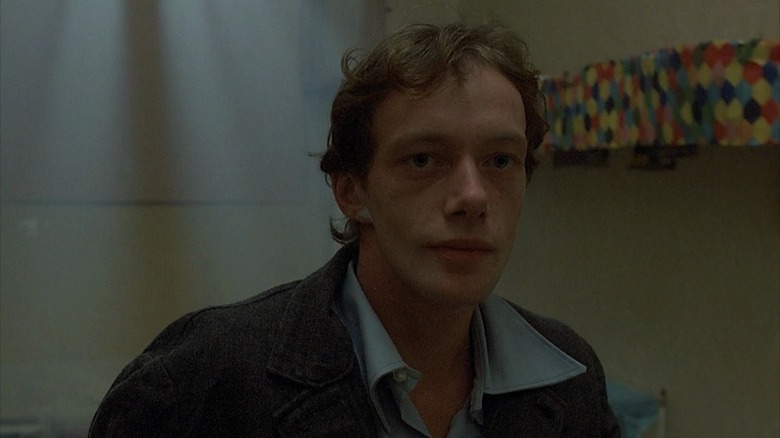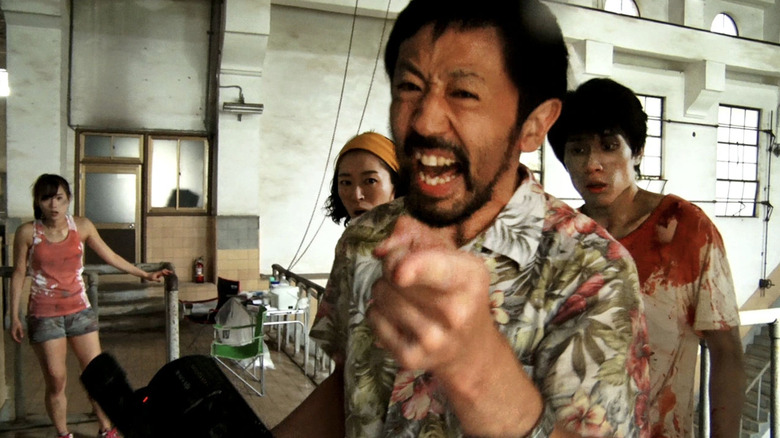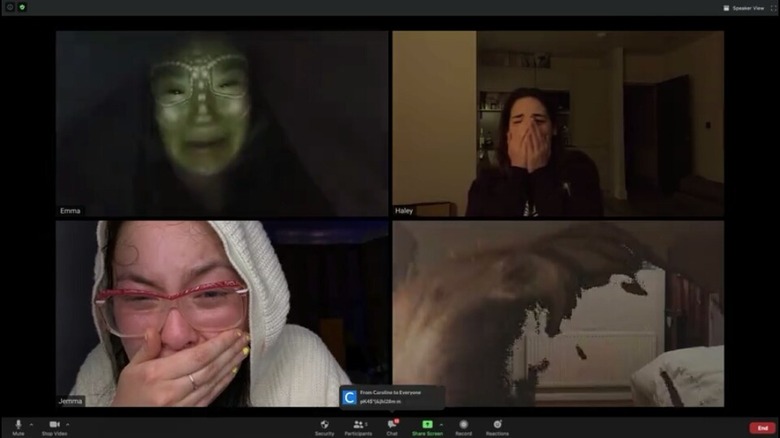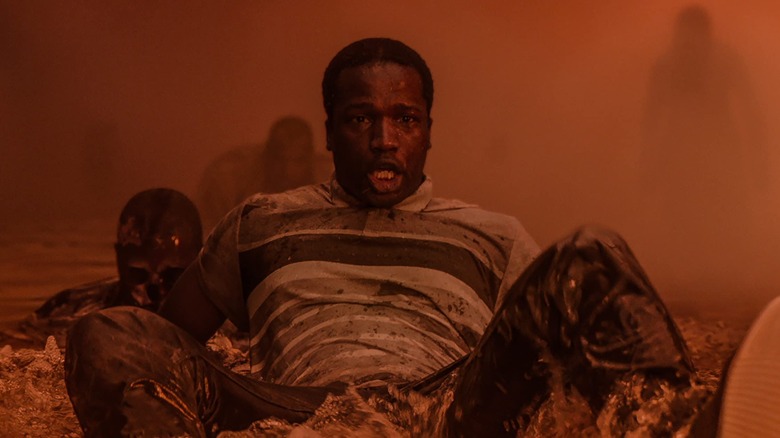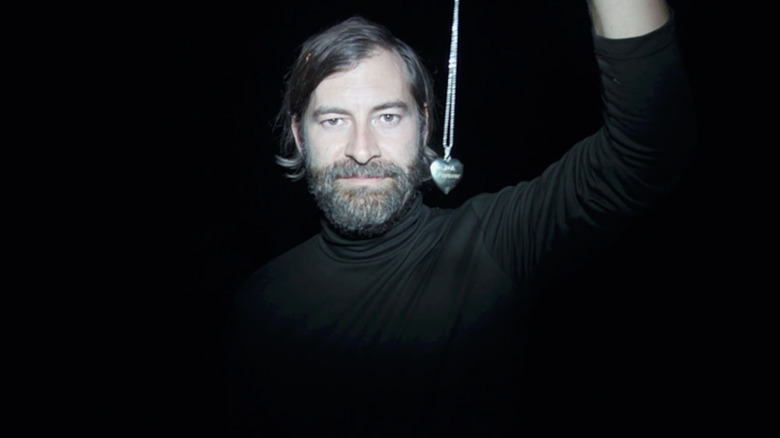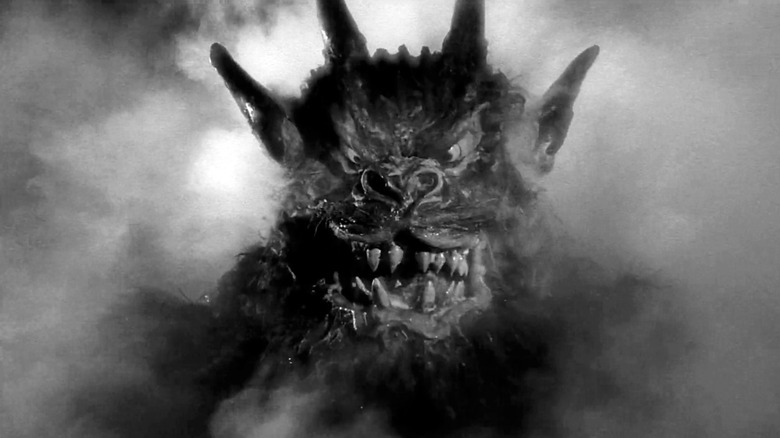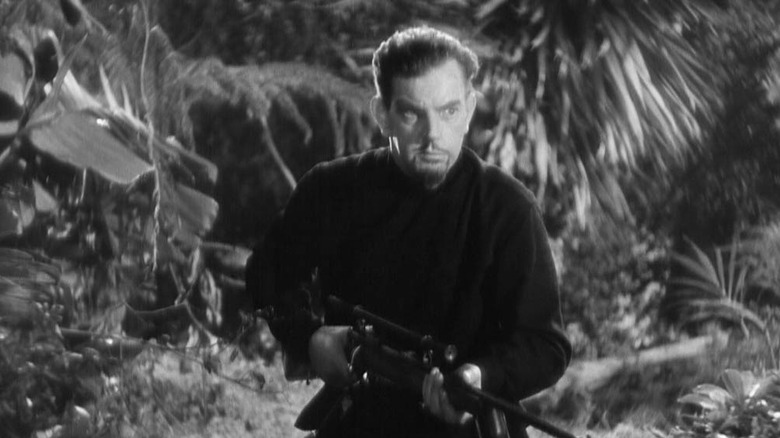The Best Horror Movies With Perfect Rotten Tomatoes Scores
Throughout cinema's history, horror has never been a critical darling. Horror was the realm of populist B-pictures; a genre that could always guarantee butts in seats, but rarely ascended to the critical regard withheld for its more respectable genre cousins. While the Academy Awards aren't the most reliable litmus test, it is telling that only six horror films have ever been nominated for Best Picture: "The Exorcist," "Jaws," "The Silence of the Lambs," "The Sixth Sense," "Black Swan," and "Get Out." However you may feel dear reader (and trust me, you're among friends), as far as the historical tastemakers are concerned, horror is low art. It's entertainment, sure. But its aesthetic value is suspect. Or so the powers that be would have you believe.
While the tide has certainly changed in recent years (enjoying the genre is no longer the black mark it once was), the reticence to acknowledge horror as more than spectacle still persists. When people defensively attempt to re-contextualize "good" horror films as elevated horror, it is a dead giveaway of the reflex to feel embarrassment for liking horror movies at all. Indeed, the genre has always been smart, beautiful, and thought provoking. Two of the six films on this list are nearly 100 years old. And while it's tempting to perceive the overwhelming presence of modern films as recency bias, we'd like to think it's merely a sign that perhaps the tide is finally starting to turn.
So with all that said, sit back, and settle in for our breakdown of the horror films currently enjoying a perfect 100% critical approval ratings on the review aggregator Rotten Tomatoes.
Beware light spoilers below.
M
Hans Beckert stalks the streets of Berlin. Only, to a casual passerby, it might not look like stalking. Beckert is physically unassuming. He's a wide-eyed, dumpy nobody, who's more easily imagined behind a typewriter than the handle of a knife. And yet, as Berliners are about to learn, Hans Beckert is a monster: a serial murderer compelled to kill children. Soon, Beckert's crimes cast a fearful shadow over the city. The authorities crack down, utilizing every forensic tool at their disposal. Meanwhile, the criminal underbelly begins to assemble its own manhunt, so they can resume their activities, unbothered by the heightened police presence.
It would be a mistake to dismiss "M" for its age. Released in 1931, Fritz Lang's masterful procedural terror trip has lost none of its staying power. "M" occupies the fuzzy midsection of the Venn Diagram between the horror and thriller genres, rubbing bloodied shoulders with the likes of "Manhunter," "Se7en," and "Deep Red." Lang's vision of Berlin is a sparse and barren place, suffocated in shadows. Lawmen and criminals are indistinguishable forces: cruel, twisted men prone to violence, fraying at the seams, and overwhelmed by a desire to reestablish control. Despite his minimal screen time, Peter Lorre's Beckert conjures both our repulsion and understanding. He's monstrous, yes. But how are his violent compulsions different from those of the Berliners itching to spill his blood?
Arguably, "M" stands for "Masterpiece." After all, Lang's film boasts an inarguably perfect score on Rotten Tomatoes, with the likes of Roger Ebert hailing the film as "a portrait of a diseased society ... it's a wonder it escaped the attention of the Nazi censors."
Frankenstein
The gargantuan gothic pillar of the Classical Hollywood era, James Whale's "Frankenstein" adapts Mary Shelly's 1818 novel of the same name with tremendous style, grace, and pathos. Fuelled by a Promethean desire to play god, Dr. Henry Frankenstein (Colin Clive) sets about fashioning an abomination out of rotting flesh: a man, made out of the piecemeal parts of many men, invigorated by electricity and the hubris of its creator.
Directed by the legendary James Whale (who would go on to direct the campier, and arguably better sequel "Bride of Frankenstein"), this monumental classic refuses to show its age, running circles around its Universal monster peers that later emerged and felt altogether lifeless by comparison. Much like its titular creature, the enduring success of Frankenstein is an amalgam of many talents, chief among them Arthur Edeson and Paul Ivano's strikingly expressionist cinematography and Charles D. Hall's chilling art direction. But it is impossible to praise "Frankenstein" without paying homage to Boris Karloff's performance. Without uttering a word, Karloff cements his immortality on the silver screen as a physical force to be reckoned with, who's capable of conjuring pity out of wounded glances and shaking palms.
"Frankenstein" is a tragic tale of arrogance and existential meddling, and its perfect Rotten Tomatoes score is further testament to a story that continues to move and shock in the 21st century.
Angst
It is no small miracle that Gerarld Kargl's legendarily hard-to-watch "Angst" currently enjoys a 100% rating on Rotten Tomatoes. A devoted illustration of the brutality perpetuated by real-life psychopaths, "Angst" follows an unnamed serial killer (Erwin Leder) after he is released from prison. As soon as the gates close behind him, the thoroughly un-rehabilitated killer immediately scampers off into the world to commit the perfect murder. This was always part of the plan; now, it's just a question of finding a suitable victim. After several false starts and missed opportunities, the killer soon hits a madman's jackpot: a secluded estate surrounded by thick woods. When the inhabitants — an elderly woman, her daughter, and handicapped son — return home, the killer wastes no time unleashing his perverse desires on the unsuspecting family.
"Angst" is one of those films you can't really recommend in good conscience to anyone. But it is, undoubtedly, one of the greatest horror films ever committed to celluloid. Forcing its audience into unbearably close proximity to its subject, with cinematography that lurches and floats with disembodied queasiness and curiosity, the film careens between psychotic justifications and erotic degeneracy, as the killer monologues throughout the film's runtime, detailing his sadism and decision-making with unnerving ease. Charged with a primal and distressingly clumsy violence, few films can genuinely claim to be this viscerally uncomfortable to sit through. As Meagan Navarro of Bloody Disgusting puts it, the film "makes even 'Henry: Portrait of a Serial Killer' look somewhat tame."
One Cut of the Dead
If you haven't had the joy of watching "One Cut of the Dead" just yet, heed this warning: It is best, if possible, to go into it blind. No spoilers here, but proceed at your own risk. Part of the undeniable charm of Shinichiro Ueda's 2017 Japanese horror film is in its revelations and the cunning way it lulls you into thinking you're in for yet another low-budget found footage flick, before revealing that it's something else entirely. To say much more would be to give away the mid-film rug pull. But if you're finding yourself rolling your eyes during the film's first act, push on: There are bloody delights awaiting you on the other side. To call it a slow burn doesn't really do it justice. "One Cut of the Dead" is more akin to a long and winding stand-up routine.
Sitting pretty with a perfect Rotten Tomatoes score as of the time of publishing, "One Cut of the Dead" has been unanimously praised for its cheeky mix of gleeful gore and intelligent meta commentary. As Carlos Aguilar of The Los Angeles Times puts it, the film is "a master class in endless narrative inventiveness and an ode to the resourceful and collaborative spirit of hands-on filmmaking." Part of that collaboration comes from you, the audience, and your willingness to give yourself over to Ueda's unfurling Russian doll (each layer bloodier and more hilarious than the last). As the title boldly proclaims, much of its action takes place in a genuine single take, free from cuts but bountiful in bites, screams, and foregone limbs. Few horror films manage to secure a flawless Rotten Tomatoes score. And of that number, only "One Cut of the Dead" qualifies as that rarest of breeds: the genuinely horrific (and hilarious) horror comedy.
Host
Look, the early days of quarantine made all of us do wild things. But — and not to victim blame here — holding a virtual Zoom sèance is just asking for trouble. "Host" follows six pals who have the bright idea to hire a medium to help them communicate with the dead over the internet. What begins as an awkward filler for their weekly Zoom hang soon descends into something far more sinister, as the group begins to notice unexplainable phenomena, and realize that their cheeky social event might have unleashed a malevolent spirit.
A document of both the uncanny digital state of being that defines modern-day quarantine and the increasing popularity of the "screenlife genre," "Host" earned unanimous praise on Rotten Tomatoes for its economic filmmaking and effective scares. As Jenna Stoeber writes for Polygon, the film is "deeply clever, playing off familiar aspects of video call technology and not at all skimping on the stunts." Mary Beth McAndrews of Film Cred sums up the film's appeal nicely, praising "Host" for proving "how crucial found footage is in capturing social fears ... by adapting to current world events and the popular technology that goes with it." For the best viewing results, watch on your laptop in your bed at 2 in the morning with the lights off.
His House
An outstanding feature film debut from British director Remi Weekes, "His House" follows Bol (Sope Dirisu) and Rial (Wunmi Mosaku), a couple who arrive in the United Kingdom after fleeing South Sudan. As a condition of their asylum, Bol and Rial must abide by the strict rules that govern their day to day lives and must live in assigned housing. It's a crumbling tenement house in a racist neighborhood, but after dealing with so many hardships, having a roof over their heads means the world to them. While Bol tries assimilate into British culture, Rial can't shake the feeling that something dark has followed them across the ocean. Still grieving the loss of their daughter, who did not survive the journey, the couple soon begins to feel the presence of something dark and angry lurking within the walls of the house they've been ordered to live in.
A harrowing and powerfully realized tale of survivor's guilt and the ghosts of the past, "His House" exposes the real horrors of a dehumanizing immigration system, while conjuring actually disturbing supernatural spooks. An emotional and genuinely terrifying modern take on the haunted house formula, "His House" recalls the nightmarish dream logic of Lucio Fulci while carving out a space all its own. Sporting a perfect critical consensus on Rotten Tomatoes, "His House" balances its disarming intelligence with genuinely unsettling imagery that puts most modern supernatural fare to shame. As Tim Grierson of Screen Daily aptly sums up: "The film has much to say about grief, guilt, assimilation, and the on-going refugee crisis. And on top of that, it's also a nifty nerve-jangler." In the end, "His House" is proof that horror films can do it all.
Creep 2
Aaron (Mark Duplass) is getting old: 40 is looming on the horizon and his passion project is starting to feel like any humdrum day job. And hey, look, midlife crises are a dime a dozen. They're a natural part of getting older and staring your own mortality in the face. And for Aaron, the joy of plunging axes and kitchen knives into unsuspecting jugulars just doesn't have the same pizzaz now that gray hairs have started invading his temples. Murdering people just doesn't have the same je-ne-sais-quoi that it used to. And finding himself going through the motions, Aaron begins to wonder how he can carry on. Enter: Sara (Desiree Akhavan), an aspiring director in a similar creative slump. Her web series, "Encounters," isn't doing as well as she'd hoped, and in a last-ditch effort to save her show, Sara answers Aaron's sinister Craigslist ad to show up, in the middle of nowhere, with a camera and an open mind.
A terse, tension-filled game of cat and mouse where it's never quite clear who is the cat and who is the mouse, "Creep 2" is a shocking follow-up to 2014's "Creep," blending dark humor and found footage horror tropes to skin-crawling effect. Released in 2017, many critics including AV Club's Alex McLevy noted that the sequel "improves on the first film nearly every way," reserving special praise for Akhavan's magnetic screen presence. Supplemented with "white-knuckle, anxiety-inducing tension," as Dead Central's Jonathan Barkan notes, "Creep 2" outshines its predecessor and then some.
Curse of the Demon
Doctor of Psychology and ardent skeptic Dr. John Holden (Dana Andrews) is en route to London to co-facilitate a rather peculiar seminar: A lecture aimed at exposing devil worship, witchcraft, and occult power as nothing more than smoke, mirrors, and persuasion. The central target of the symposium is the ridiculously goateed Julian Karswell (Niall MacGinnis), a local cult leader who appears to have a vice grip on his followers. When Dr. Holden arrives in England, he is surprised to learn that his collaborator, Dr. Harrington, has been killed in a freak electrical accident. Only, his whip-smart niece (Peggy Cummins) thinks the brutalized state of her uncle's corpse points to a far more violent, and perhaps supernatural, cause. While Dr. Holden remains adamant that Karswell is nothing but a charming conman, the evidence begins stacking up that he may be the next to die by ... unnatural means.
Directed by the French master of the macabre Jacques Tourneur (the man behind "Cat People" and "I Walked With a Zombie"), "Night of the Demon" pits stubborn rationality against unhinged beliefs with genuinely terrifying results. While "folk horror" wouldn't be properly codified as a horror sub-genre until the late 1960s or early 1970s, the rumblings of occult-based cinematic spooks are present in this 1957 chiller. As Chicago Reader critic Dave Kehr writes in his 1985 review, Tourneur's film is "intelligent, delicate, and actually frightening," managing to conjure true terror out of the unseen and the implied.
The Most Dangerous Game
A renowned big-game hunter named Bob (Joel McCrea) is cheerfully sailing on a luxury yacht, regaling his fellow passengers with thrilling tales of his past exploits. Then, suddenly, their vessel smashes into an uncharted reef, killing everyone on board save Bob, who miraculously survives and washes up on the shore of a seemingly desolate Caribbean island. Soon, Bob finds himself the guest of the eccentric Count Zaroff (Leslie Banks), a mysterious Russian recluse. Finding that he is not the only shipwrecked guest in Zaroff's castle, Bob soon learns that his host fashions himself something of an accomplished hunter. Only, Count Zaroff doesn't hunt animals. His interests lie elsewhere, in more cunning prey: humans.
Set loose into the treacherous jungle, Bob and fellow victim Eve (Fay Wray) must survive until sunrise if they want to make it off the island alive. Somewhere between cowering in tree trunks and evading Zaroff's hounds, Bob begins to sympathize with the animals he once hunted.
Based on a 1924 short story by Richard Connell, Irving Pichel and Ernest B. Schoedsack's 1932 adaptation of "The Most Dangerous Game" was lauded by contemporary New York Times critic Mordaunt Hall, as "a highly satisfactory melodrama" with special praise reserved for Banks' scene-stealing performance as the dastardly Count. Meanwhile, modern-day outlets like TimeOut have positively remarked on the film's status as "one of the best and most literate movies from the great days of horror." Wasting no time with its breakneck pace, "The Most Dangerous Game" persists nearly a century later with its morbid delights.
